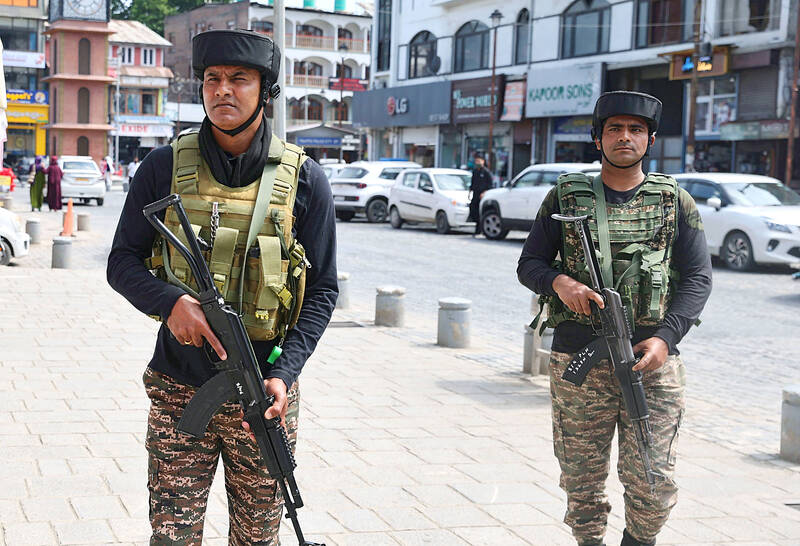Indian Prime Minister Narendra Modi was set to address the nation yesterday for the first time since a weekend ceasefire with Pakistan that brought the nuclear-armed rivals back from the brink of all-out war.
Modi’s office said the television address would start at 8pm. US President Donald Trump announced the truce late on Saturday after four days of missile, drone and artillery attacks that killed at least 60 people and sent thousands fleeing on both sides.
The heads of military operations of India and Pakistan were also set to review the truce later yesterday.

Photo: EPA-EFE
It comes after the Indian army reported the “first calm night in recent days” in Kashmir and along its western border with Pakistan.
Initially the conversation had been due to take place at midday, but Indian officials said it had been delayed to the evening.
Abdul Basit at the S. Rajaratnam School of International Studies in Singapore said it would be about modalities of the ceasefire and not policy decisions.
The aim is to “avoid any miscalculations, because right now one spark could quickly move towards a nuclear catastrophe,” Basit said.
The flare-up in violence was the worst since the rivals’ last open conflict in 1999 and sparked global shudders that it could spiral into full-blown war.
There were initial doubts as the rivals accused each other of breaching the ceasefire just hours after it was unexpectedly announced by Trump on social media.
“The night remained largely peaceful across ... Kashmir and other areas along the international border,” the Indian army said.
“No incidents have been reported, marking the first calm night in recent days,” the statement added.
India yesterday reopened 32 airports that had been closed due to the conflict, authorities said.
Top Indian and Pakistani military officials held briefings late on Sunday, with each claiming the upper hand and warning they were ready to respond if there were fresh attacks.
“We have delivered the promise we made to our people,” Pakistani military spokesman Lieutenant General Ahmed Sharif Chaudhry said, calling it a “success on the battleground.”
“We re-established deterrence and neutralized key threats,” Pakistani Air Vice Marshal Ahmed Aurangzeb told reporters. “We have thus far exercised immense restraint ... and our actions have been focused, measured and non-escalatory,” Indian Lieutenant General Rajiv Ghai said.
“Any threat to the sovereignty, territorial integrity and safety of our citizens will be met with decisive force,” he added.
It was also the second straight night without gunfire or shelling at Poonch, a frontier town in the part of divided Kashmir administered by India.
Poonch was one of the worst-hit places in India, with at least 12 residents killed and most of the estimated 60,000 residents fleeing their homes. On Sunday, people started trickling back, although many were still jittery about the ceasefire.
Thousands of schools remained closed across Pakistan-administered Kashmir as areas were cleared of debris from strikes and firing, local official Naveed-Ul-Hassan Bukhari said.

Taiwan is projected to lose a working-age population of about 6.67 million people in two waves of retirement in the coming years, as the nation confronts accelerating demographic decline and a shortage of younger workers to take their place, the Ministry of the Interior said. Taiwan experienced its largest baby boom between 1958 and 1966, when the population grew by 3.78 million, followed by a second surge of 2.89 million between 1976 and 1982, ministry data showed. In 2023, the first of those baby boom generations — those born in the late 1950s and early 1960s — began to enter retirement, triggering

ECONOMIC BOOST: Should the more than 23 million people eligible for the NT$10,000 handouts spend them the same way as in 2023, GDP could rise 0.5 percent, an official said Universal cash handouts of NT$10,000 (US$330) are to be disbursed late next month at the earliest — including to permanent residents and foreign residents married to Taiwanese — pending legislative approval, the Ministry of Finance said yesterday. The Executive Yuan yesterday approved the Special Act for Strengthening Economic, Social and National Security Resilience in Response to International Circumstances (因應國際情勢強化經濟社會及民生國安韌性特別條例). The NT$550 billion special budget includes NT$236 billion for the cash handouts, plus an additional NT$20 billion set aside as reserve funds, expected to be used to support industries. Handouts might begin one month after the bill is promulgated and would be completed within

One of two tropical depressions that formed off Taiwan yesterday morning could turn into a moderate typhoon by the weekend, the Central Weather Administration (CWA) said yesterday. Tropical Depression No. 21 formed at 8am about 1,850km off the southeast coast, CWA forecaster Lee Meng-hsuan (李孟軒) said. The weather system is expected to move northwest as it builds momentum, possibly intensifying this weekend into a typhoon, which would be called Mitag, Lee said. The radius of the storm is expected to reach almost 200km, she said. It is forecast to approach the southeast of Taiwan on Monday next week and pass through the Bashi Channel

NO CHANGE: The TRA makes clear that the US does not consider the status of Taiwan to have been determined by WWII-era documents, a former AIT deputy director said The American Institute in Taiwan’s (AIT) comments that World War-II era documents do not determine Taiwan’s political status accurately conveyed the US’ stance, the US Department of State said. An AIT spokesperson on Saturday said that a Chinese official mischaracterized World War II-era documents as stating that Taiwan was ceded to the China. The remarks from the US’ de facto embassy in Taiwan drew criticism from the Ma Ying-jeou Foundation, whose director said the comments put Taiwan in danger. The Chinese-language United Daily News yesterday reported that a US State Department spokesperson confirmed the AIT’s position. They added that the US would continue to